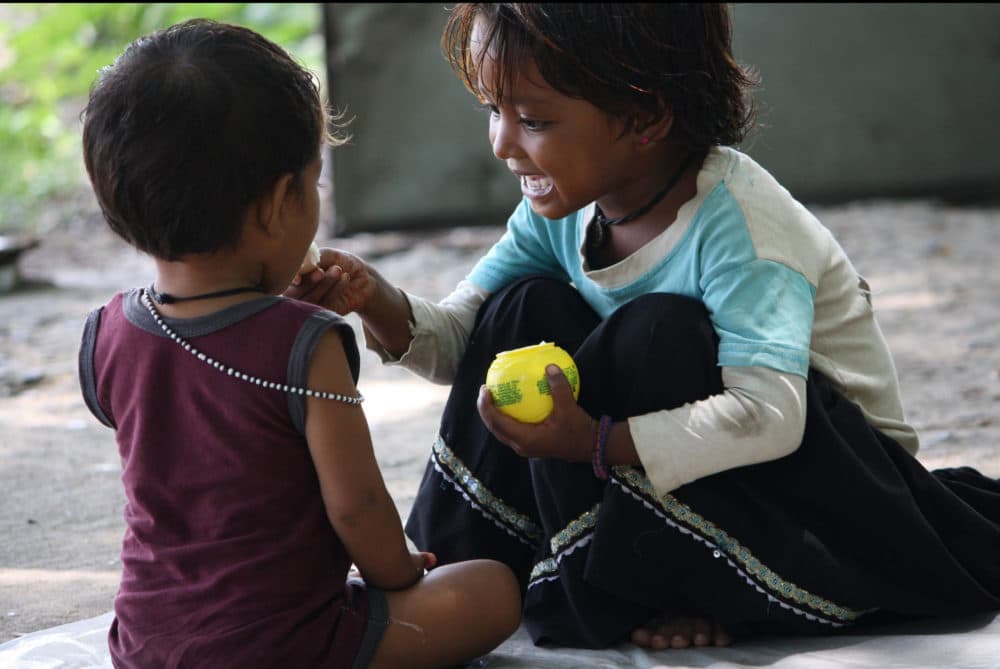Advertisement
Teaching Your Kids Kindness May Help Them Succeed Later In Life
Resume
Let's face it: When it comes to raising children, certain success factors, such as academic grades or athletic performance, are relatively easy to measure. But science suggests focusing on them may be shortsighted.
That's part of the reason why Adam Grant, organizational psychologist at the University of Pennsylvania's Wharton School of Business, is urging parents to emphasize caring and kindness to their children.
"The evidence is clear that in the long run, the kids who achieve the greatest success are not the ones who faced a ton of pressure to get straight As," Adam said. "They're the ones who were taught to be concerned about others and show compassion."
According to one Harvard study, 80 percent of youth say their parents value achievement and happiness over caring for others. That perception can seriously affect young people's ethical standards, making anti-social actions like cheating, bullying, or lying more likely.
Adam Grant joined us to talk about some of the surprising benefits that come with raising caring kids. He started by telling us about some of the ways he and his wife, Allison Sweet Grant, are teaching kindness to their own three children at home.

Interview Highlights
Adam Grant (AG): "I noticed when we sit down at the dinner table, we'd ask our kids, 'How was the test?' and, 'How was the game?' And immediately, their attention gets focused on grades and goals. So we started asking our kids once a week at dinner, 'Who did you help this week?'
At first, we got a lot of 'I forgot' or ‘no one.’ But as we kept asking, they started coming up with more thoughtful answers. Part of it was that they noticed things they were doing that helped others [and] part of it was they knew we were going to ask. They looked for opportunities to help day-to-day."
On Parents Over-Emphasizing High Achievement
AG: "I think they should look at the systematic evidence that that tells a very different story. One is a study of how much money people earn in their careers. And if you rewind the clock, it's the boys who are rated as 'helpful' by their kindergarten teacher who end up earning more money 30 years later, not the boys who are the stars academically in kindergarten.
There's another study showing that middle school students who go out of their way to help and cooperate with and share with their peers actually get better grades and higher standardized test scores than their classmates who are less caring and helpful.
There's something about being taught early on to be concerned about others that actually enhances your own success later."
On Using Nouns Instead Of Verbs
AG: "We want kids to think about this in terms of values and identity, not just accomplishments. If you praise kids for being 'a helper' instead of for helping, then they're actually significantly more likely to step up and be generous. They start to internalize the behavior as part of their identity and they're more likely to do it.
Advertisement
There's a great experiment in preschools where if toddlers are asked not, 'Will you help?' but 'Will you be a helper?' They are 22 to 29 percent more likely to help."
On Empowering Children
AG: "If you look at kids who grow up to be generous and socially responsible, one of the defining beliefs they have is that they matter in the world. 'Mattering' is a term coined by sociologists to capture the feeling that other people notice you, care about you and rely on you. Where I've watched most parents miss the mark is on that last piece. Kids need to feel depended on in some way. So one of the ways we could have that conversation with them is actually to ask them for advice.
Four years ago, I was getting ready to give my first TED Talk [and] I was extremely nervous. I sat down with our daughters and said, 'I'm nervous for this big speech I have to give. What do you think I should do?' And I was amazed. They started giving me good suggestions … and lo and behold, one of our daughters was in a play a few weeks later and instead of telling her what to do, I was able to go back and say, 'Well, what did you suggest to me when I had to get onstage? I bet you could follow your own advice.' It was an opportunity for me to teach them that they can rely on themselves. I'd love to see more parents do that. I found it really powerful."
On Parents' Influence
AG: "Most of us overestimate our influence as parents and we underestimate how much of our kids are shaped by their biology. We know that peers often matter just as much as parents do. I say that not to depress anyone, but to say we shouldn't beat ourselves up so much.
It's obviously important to be intentional about what we teach our kids. But we should also have some humility about the fact that there are ways our kids are going to develop that are completely out of our control."
On The Importance Of Teaching Fairness In Addition To Kindness
AG: "I think that along with teaching generosity, we need to teach justice and fairness. When people act selfishly, they need to be held accountable to do more for others, to think about their community, [and] to expand what's often called their 'circle of moral regard.' I want to live in a world of kind, caring, decent human beings. But I also want to live in a world where when people violate those principles, there's a real sense of justice.
Let's apply this to the coronavirus pandemic. We want the default to be to give. Then if I encounter someone who seems to have more of a 'taking' stance, then I'm going to shift into 'matching' mode and say, 'Look, I expect you to pay it forward.'
Most of us want to be generous, and when we see somebody else act that way or when we're recipients of generosity, that creates a feeling of what's called 'moral elevation,' [where] we realize we can do more for others and we want to do more for others."
Guest
- Adam Grant is an organizational psychologist at the University of Pennsylvania’s Wharton School of Business. He is the host of TED’s WorkLife podcast and the co-author of the children's book The Gift Inside The Box.
